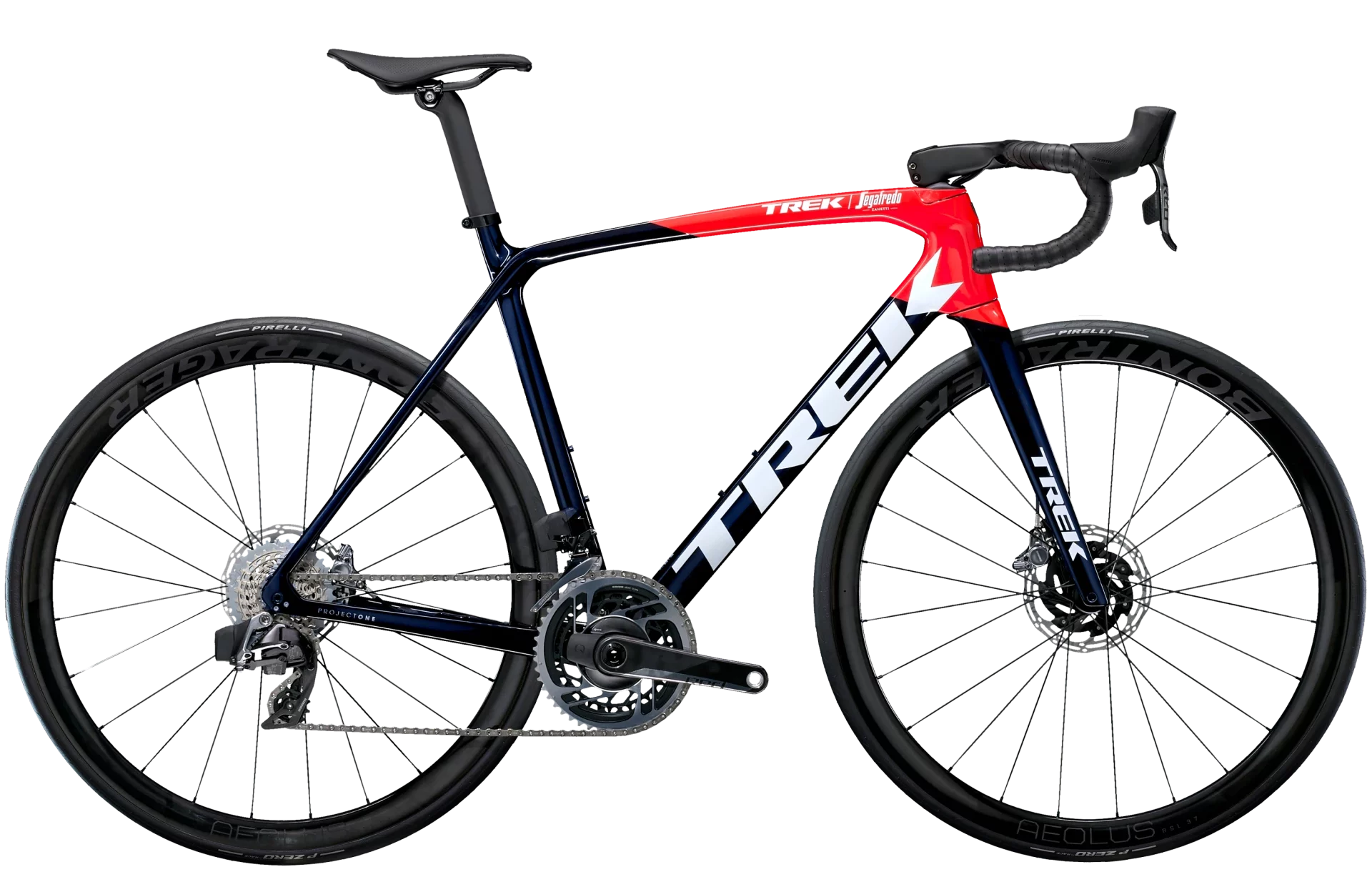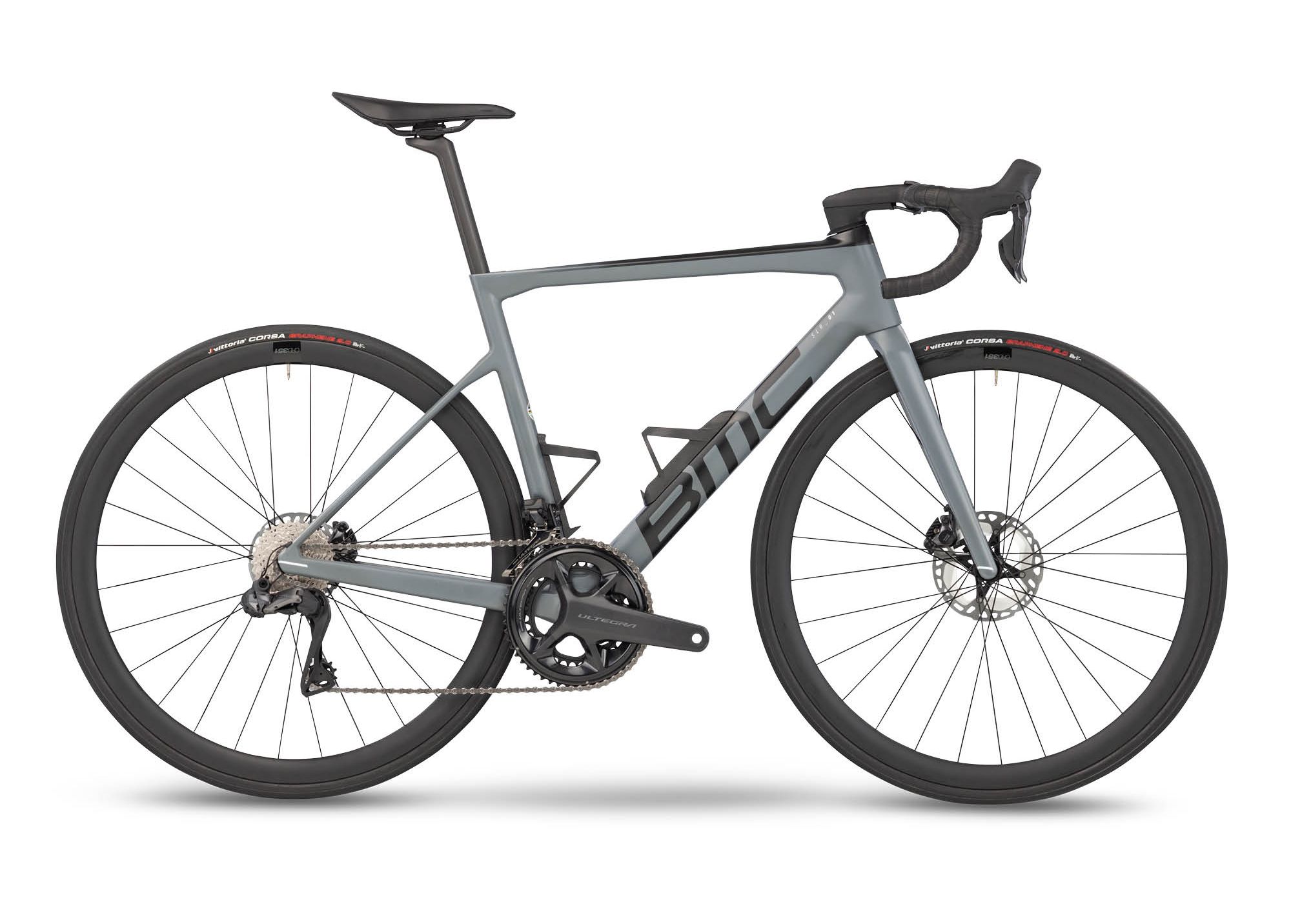In this article, I’ll guide you through a comparison between the Trek Emonda and BMC Teammachine SLR; both popular road bikes among cyclists.
I’ll walk through the Trek Emonda and BMC Teammachine SLR models lineup, their specifications, and retail pricing (USD). I’ll explain the carbon fiber technology used (Trek OCLV vs BMC ACE+), and unique frameset features for each bike.
The goal is to help you get a better understanding before you make your final purchasing decision.
| Trek Emonda | BMC Teammachine SLR | |
|---|---|---|
| Type of bike | Lightweight, all-rounder | Lightweight, all-rounder |
| Frame material | OCLV 800 carbon OCLV 500 carbon | Premium 01 carbon Premium carbon |
| Frame sizes | 47, 50, 52, 54, 56, 58, 60, 62 | 47, 51, 54, 56, 58, 61 |
| Groupset | Shimano, SRAM (12-speed) | Shimano, SRAM, Campagnolo (12-speed) |
| Brakes | Hydraulic disc | Hydraulic disc |
| Price (USD) | $4,999 to $13,199 | $3,199 to $15,999 |
Trek Emonda

The Trek Emonda is a lightweight bike for the high mountains.
The lightest Trek Emonda frame weighs less than 700g using Trek’s OCLV 800 carbon. This is the bike Richie Porte rode to his third place in the 2020 Tour de France.
The SLR is the lightest and most expensive atop the Trek Emonda models. There are six Emonda SLR options, specced electronic shifting groupsets from SRAM or Shimano.
Next in line is the SL, the mid-range, more budget-friendly option. It has the same frame design and geometry as the SLR but uses the OCLV 500 carbon instead. The groupset choices are Shimano Ultegra Di2, Shimano 105 Di2, SRAM Force AXS, or SRAM Rival AXS.
The Trek Emonda SLR and SL framesets are also available separately.
| Model | Frame material | Groupset | Wheelset | Retail price (USD) |
|---|---|---|---|---|
| Trek Emonda SLR 9 AXS | OCLV 800 carbon | SRAM Red eTap AXS | Bontrager Aeolus RSL 37 | $13,199 |
| Trek Emonda SLR 9 | OCLV 800 carbon | Shimano Dura-Ace Di2 (R9200) | Bontrager Aeolus RSL 37 | $12,749 |
| Trek Emonda SLR 7 AXS | OCLV 800 carbon | SRAM Force eTap AXS | Bontrager Aeolus Pro 37 | $9,699 |
| Trek Emonda SLR 7 | OCLV 800 carbon | Shimano Ultegra Di2 (R8100) | Bontrager Aeolus Pro 37 | $8,999 |
| Trek Emonda SLR 6 AXS | OCLV 800 carbon | SRAM Rival eTap AXS | Bontrager Aeolus Pro 37 | $8,399 |
| Trek Emonda SLR 6 | OCLV 800 carbon | Shimano 105 Di2 (R7100) | Bontrager Aeolus Pro 37 | $7,699 |
| Trek Emonda SL 7 AXS | OCLV 500 carbon | SRAM Force eTap AXS | Bontrager Aeolus Pro 37 | $6,699 |
| Trek Emonda SL 6 | OCLV 500 carbon | Shimano 105 Di2 (R7100) | Bontrager Aeolus Elite 35 | $4,999 |
Trek Emonda vs others
BMC Teammachine SLR

The BMC Teammachine SLR is an all-rounder, pure-breed race bike.
Cadel Evans won the Tour de France in 2011 on the same BMC Teammachine SLR01 model, albeit an older generation model. At first glance, the naming convention of the Teammachine SLR01 can be confusing and looks to be all over.
There are two versions available; BMC Teammachine SLR01 (higher grade) vs BMC Teammachine SLR (standard).
Both models have the same frame geometry but differ in carbon fiber grade (Premium 01 Carbon vs Premium Carbon vs ), internal vs external cable routing, and components.
The range-topping model is the BMC Teammachine SLR01 Ltd, the same bike the AG2R Citroën Team rode at the 2023 Tour de France. It’s followed by the One, Two Three, Four, and Five models. Top-of-the-line BMC Teammachine SLR01 models are equipped with Shimano Dura-Ace Di2 or SRAM Red AXS. Mid-range models are equipped with Shimano Ultegra Di2 or SRAM Force AXS.
| Model | Frame material | Groupset | Wheelset | Retail price (USD) |
|---|---|---|---|---|
| BMC Teammachine SLR01 Ltd | Premium 01 carbon | Campagnolo Super Record EPS | Campagnolo Bora Ultra Disc WTO | $15,999 |
| BMC Teammachine SLR01 One | Premium 01 carbon | SRAM Red eTap AXS | Zipp 353 NSW | $14,999 |
| BMC Teammachine SLR01 Two | Premium 01 carbon | Shimano Dura-Ace Di2 (R9200) | DT Swiss ARC 1100 DICUT | $12,999 |
| BMC Teammachine SLR01 Three | Premium 01 carbon | Shimano Ultegra Di2 (R8100) | DT Swiss ARC 1650 | $9,299 |
| BMC Teammachine SLR01 Four | Premium 01 carbon | SRAM Force eTap AXS | CRD-351 SL | $8,499 |
| BMC Teammachine SLR01 Five | Premium 01 carbon | Shimano Ultegra Di2 (R8100) | CRD-351 SL | $7,499 |
| BMC Teammachine SLR One | Premium carbon | Shimano Ultegra Di2 (R8100) | CRD-351 | $6,499 |
| BMC Teammachine SLR Two | Premium carbon | SRAM Force eTap AXS | DT SWISS P1800 | $5,999 |
| BMC Teammachine SLR Three | Premium carbon | Shimano Ultegra Di2 (R8100) | XRD-522 | $5,599 |
| BMC Teammachine SLR Four | Premium carbon | SRAM Rival eTap AXS | XRD-522 | $5,199 |
| BMC Teammachine SLR Five | Premium carbon | Shimano 105 Di2 (R7100) | Mavic Open Disc | $4,599 |
BMC Teammachine SLR vs others
Trek vs BMC carbon fiber
Trek OCLV carbon
The OCLV (Optimum Compaction, Low Void) carbon is a proprietary carbon fiber manufacturing technology developed by Trek.
- Optimum Compaction refers to the heat and pressure applied during the curing process to squeeze out excess resin and ensure that the carbon layers are compacted to the optimal density.
- Low Void refers to the goal of reducing microscopic air pockets or voids that can occur in the carbon fiber and create weaknesses.
One of the key advantages of OCLV carbon is its ability to achieve an optimal balance between stiffness, strength, and weight. Trek engineers carefully tune the carbon layup and utilize varying modulus carbon fibers to create stiff frames in certain areas to maximize power transfer while maintaining compliance in other areas to enhance comfort and ride quality.
The OCLV carbon is available in 800 and 500 series.
- OCLV 800 is the highest-grade carbon fiber used by Trek. The carbon modulus is higher in OCLV 800, making it stiffer and lighter. The manufacturing process is more refined, using more advanced carbon and resins, leading to a bike frame that provides top performance levels for stiffness, weight, and strength. OCLV 800 is used in all models with SLR.
- OCLV 500 is a lower-grade carbon but still offers a high level of performance. It has a slightly lower carbon modulus, meaning it’s a bit less stiff and heavier than OCLV 800. OCLV 800 is used in all models with SL.
It’s worth noting that the different OCLV grades don’t only refer to the material itself, but also to the manufacturing techniques used to form the carbon fiber into bike frames. Higher-grade carbon requires more precise manufacturing techniques to take full advantage of its superior material properties.
BMC ACE+
The BMC ACE+ (Accelerated Composites Evolution Technology +) is the latest carbon fiber layup technology used on all BMC road bikes.
ACE+ operates by determining the cross-sections of the frame, the arrangement of the carbon layers, and the geometric structure based on targeted performance values. Subsequently, it generates thousands of virtual models to pinpoint the ideal equilibrium of performance, focusing on three fundamental aspects; Stiffness, Weight, and Compliance.
BMC has two different carbon grades, 01 Premium Carbon and Premium Carbon, in their road bike frames. The choice between the two carbon grades depends on the rider’s preferences, budget, and desired level of performance.
- 01 Premium Carbon is a high-grade carbon fiber material with superior performance, stiffness, and weight savings. It provides enhanced ride quality with improved power transfer and responsiveness. Premium 01 carbon is used on all BMC models with 01, such as Teammachine SLR01 and Roadmachine 01.
- Premium Carbon is a mid-range carbon fiber material that balances performance, weight, and affordability. It is used on all BMC models without the 01.
Frameset technologies and innovations
Trek Emonda and BMC Teammachine SLR framesets incorporate advanced technologies to enhance their bikes’ performance and ride characteristics.
Here’s an overview of the technologies used in each bike model.
Trek Emonda
| Name | Description |
|---|---|
| OCLV Carbon | Optimum Compaction, Low Void (OCLV). A carbon fiber technology used in Trek frames. Employs advanced layup techniques and precise carbon compaction to create lightweight, strong frames with a balanced blend of stiffness and compliance. Available in two grades; OCLV 800 and 500. A higher number indicates a higher grade carbon. |
| H1.5 geometry | Trek’s geometry design that strikes a balance between aggressive racing positioning (H1) and rider comfort (H2). H1.5 geometry provides a slightly more relaxed riding position than the racier H1 geometry, making it suitable for a wider range of riders. |
| Project One | Trek’s customization program allows riders to create personalized and unique bikes. With Project One, riders can customize various aspects of their bikes, including frame color, paint scheme, components, drivetrain, wheels, and other details. |
BMC Teammachine SLR
| Name | Description |
|---|---|
| Accelerated Composites Evolution Plus (ACE+) | ACE+ utilizes advanced computer algorithms and simulation techniques to optimize the layup and design of carbon fiber frames and components. With BMC ACE+, engineers can explore various design possibilities and fine-tune the carbon layup to achieve specific performance objectives. This technology allows precise control over stiffness, compliance, weight, and aerodynamics. ACE+ enables BMC to create frames that offer optimal balance and performance characteristics by analyzing numerous virtual prototypes and conducting virtual testing. |
| Aerocore Design System | An advanced aerodynamic design approach used by BMC to optimize the aerodynamic performance of their road bikes. It is a holistic system that integrates multiple bike elements, including frame shapes, tube profiles, component integration, and overall bike geometry, to minimize aerodynamic drag and maximize efficiency. |
| Integrated Cockpit System (ICS) | Seamlessly integrates the handlebar, stem, and fork to improve aerodynamics, enhance stiffness, and provide a clean, integrated look. The elimination of external cables reduces drag and improves handling responsiveness. |
| Tuned Compliance Concept (TCC) | TCC optimizes vertical compliance by strategically tuning the carbon layup and tube shapes. This technology improves the frame’s ability to absorb road vibrations and bumps, resulting in a smoother and more comfortable ride without sacrificing performance or power transfer. |
| D-Shaped Seatpost | BMC’s D-Shaped Seatpost features a flattened shape that enhances vertical compliance and comfort by absorbing road vibrations. This design provides a smoother ride experience, particularly during long-distance or rougher road surfaces, while maintaining aerodynamic performance. |
Where to buy
Trek shops
- Trek online shops. Australia, Austria, Canada, Germany, Netherlands, United Kingdom, United States
- Trek retailers. Use this tool to find your nearest Trek retailers.
BMC retailers
- BMC retailers. Use this tool to find your nearest BMC retailers.

Alex Lee is the founder and editor-at-large of Mr. Mamil. Coming from a professional engineering background, he breaks down technical cycling nuances into an easy-to-understand and digestible format here.
He has been riding road bikes actively for the past 12 years and started racing competitively in the senior category during the summer recently.